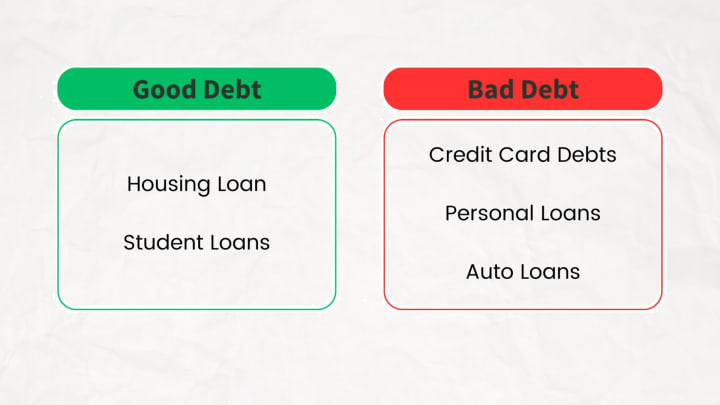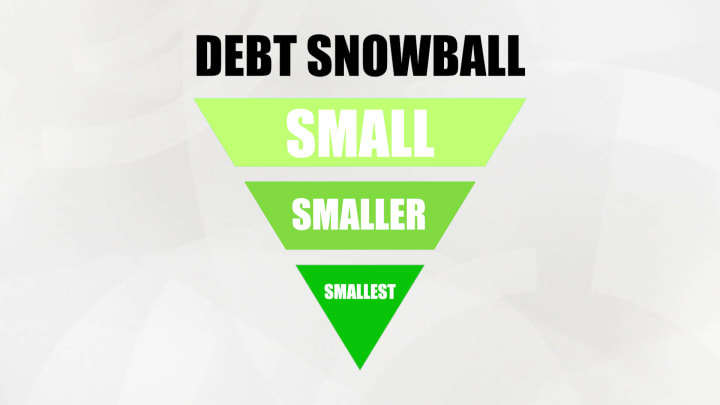I’m sure we’ve heard stories of people owing 10s, 100s, and 1000s of dollars in loans.
On the table, we find love letters from banks.
Or worse, the house is splashed with red paint.
IOU (I Owe Yous), Hutang, or Debt is a common issue that affects many individuals and families around the world.
However, with the right strategies, it’s possible to manage and pay off debt successfully.
In this story, we will cover, what is debt, types of debt, importance of managing debt, various debt management strategies, and tips to stay debt free that can help you get out of debt and improve your financial situation.
What Is Debt?
Debt is a sum of money borrowed by an individual or entity that must be repaid over time with interest. Debt can be in various forms: credit cards, loans, or mortgages.
Types Of Debt
The book, Rich Dad Poor Dad, taught me a lot about debts.
Debts can be morally categorized into Good Debt and Bad Debt.

Then, while there are good and bad debts. There are several types of debt.
- Credit card debt: Debt that is accumulated through the use of credit cards and other revolving lines of credit. Credit card interest rates in Malaysia can be relatively high, ranging from around 15% to 18% or even higher.
- Student loans: Loans that are taken out to pay for educational expenses, such as college and university tuition. Interest rates can range from 4% to 6% or more. An example of student loan in Malaysia is PTPTN.
- Mortgages or housing loans: Loans that are taken out to purchase a property. There are fixed rate and variable rate loans. So far, interest rates averaged about 4% +/-.
- Personal loans: Loans that are taken out for personal use. Normally people take out personal loans for home renovations or medical expenses. Personal loan interest rates can range from 4% to 10% or more.
- Auto loans or car loans or hire purchase loans in Malaysia: Loans that are taken out to purchase a vehicle. Interest rates can range from 3% to 5% or higher.
Examples of good debt are housing loans and student loans (some might disagree with this). Then examples of bad debts are credit card debts, personal loans, and auto loans.

The Importance Of Managing Debt
So managing debt is crucial for several reasons:
- Reducing financial stress and anxiety
- Improving credit scores
- Avoiding late fees and penalties
- Saving money on interest charges
- Achieving financial goals, such as buying a home or starting a business
Debt Management Strategies
Now that we know what is debt and the importance of managing it; here are six strategies to manage debt.
1. Create A Budget
It is an essential first step to manage your debt.
List all of your income and expenses, including debt payments.
By tracking your spending, you can identify areas where you can cut back and allocate more money toward debt repayment.
2. Set Financial Goals
This involves identifying your long-term financial objectives, such as paying off all debt or saving for a down payment on a home.
By setting specific goals, you can create a plan that will help you achieve them.
3. Prioritise Debt Repayment
This involves deciding which debts to pay off first.
There are two main approaches to debt repayment: the debt snowball approach and the debt avalanche approach.

The debt snowball approach involves paying off the smallest debt first and then using the extra money to pay off the next smallest debt.

The debt avalanche approach involves paying off the debt with the highest interest rate first and then moving on to the next highest interest rate debt.
4. Negotiate With Creditors
I know it can be scary and daunting to negotiate with creditors – ah longs.
Negotiating with creditors can be a useful strategy for managing debt. It involves contacting your creditors and asking for a lower interest rate or a payment plan that fits your budget. While not all creditors will be willing to negotiate, it’s worth trying as it can potentially save you money in the long run.
5. Consolidate Debt
This involves combining multiple debts into one loan with a lower interest rate. This can make debt repayment more manageable by reducing the number of payments and interest charges.
There are several options for consolidating debt, such as balance transfer credit cards, personal loans, or refinancing home loans. However, it’s important to carefully consider the terms and fees associated with debt consolidation before choosing this option.
6. Seek Professional Help
If you’re struggling with debt and feel overwhelmed, seeking professional help may be a good option. There are several resources available, such as credit counseling agencies or debt management companies, that can provide guidance and support in managing debt. However, it’s important to research these options carefully and choose a reputable organization.
In Malaysia, we’ve AKPK – Agensi Kaunseling and Pengurusan Kredit. In English, it is Credit Counseling and Debt Management Agency.
AKPK is a Malaysian government agency established to provide financial education, credit counseling, and debt management services to individuals facing financial difficulties.
Tips To Stay Debt-Free
Once you’ve successfully managed and paid off your debt, it’s important to develop habits that will help you stay debt-free in the future.
Here are some tips for staying debt-free:
- Continue to track your spending and create a budget
- Avoid unnecessary expenses and impulse purchases
- Save for emergencies and unexpected expenses
- Use credit cards responsibly and pay off balances in full each month
- Invest in education and financial literacy to make informed decisions about money
Conclusion
So, managing and paying off debt can be a challenging process, but with the right strategies, it’s possible to achieve financial freedom.
By creating a budget, setting financial goals, prioritizing debt repayment, negotiating with creditors, consolidating debt, and seeking professional help when necessary, you can successfully manage and pay off your debt.
Additionally, developing habits for staying debt-free can help you maintain a healthy financial situation in the future.
About the Creator
Ian Fan
Going by the handles @foodyfans and @ipropfans, Ian shares about real estate, investing, finance, travel, food, and personal growth.
Follow Ian Fan on YouTube, Instagram (food), Instagram (property), X, Facebook, Blog, and Medium.






Comments
There are no comments for this story
Be the first to respond and start the conversation.